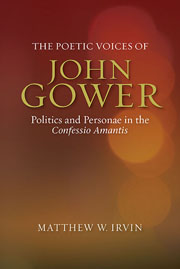Book contents
- Frontmatter
- Contents
- Dedication
- Acknowledgements
- List of Abbreviations
- Introduction: Making and Doing Love
- 1 The Inheritance of the Confessio Amantis
- 2 The Orientation of the Prologue to the Confessio Amantis
- 3 Amorous Persons
- 4 Pity and the Feminine
- 5 Labor and Art
- 6 Alienation and Value
- 7 The Love of Kings
- Conclusion: Identifying Amans
- Bibliography
- Index
- VOLUMES ALREADY PUBLISHED
3 - Amorous Persons
Published online by Cambridge University Press: 05 March 2014
- Frontmatter
- Contents
- Dedication
- Acknowledgements
- List of Abbreviations
- Introduction: Making and Doing Love
- 1 The Inheritance of the Confessio Amantis
- 2 The Orientation of the Prologue to the Confessio Amantis
- 3 Amorous Persons
- 4 Pity and the Feminine
- 5 Labor and Art
- 6 Alienation and Value
- 7 The Love of Kings
- Conclusion: Identifying Amans
- Bibliography
- Index
- VOLUMES ALREADY PUBLISHED
Summary
In Book I of the Confessio Amantis, Gower makes a major change in form. Gower's introduction of Amans and Genius, the lover and the priest of Venus to whom the lover must confess, makes the Confessio radically different from his previous poems. While, like in the Mirour, Gower produces a sermo ad status and something like a sermo de vitiis, the confession frame with its fictional personae and exemplary mode of narrative is unlike the Mirour, the Vox, or the Visio.
In this chapter, I will explore how Gower's fictional personae reorganize his moral and prudential goals, especially in his relation of art and morality, factio and actio. His use of Amans and Genius, personae he adapts from the Roman de la Rose, is central to how Gower attempts to integrate the literature of lords and that of clerics, to produce a work “somwhat of lust, somewhat of lore” (Pr.19). This integration puts cleric and noble, philosopher and lover, knowledge and experience, Latin and vernacular in conversation, a conversation that draws upon modes of clerical judgment (especially auricular confession) and noble judgment (especially in the law courts). The topic of erotic love brings affect and emotion into the conversation as well, as a fundamental part of the pleasure of both making and acting. In this chapter's concluding discussion of the “Tale of Florent,” I examine how Gower's exemplary fiction accomplishes his ends, especially in the riddling form that Gower so often favors.
- Type
- Chapter
- Information
- The Poetic Voices of John GowerPolitics and Personae in the Confessio Amantis, pp. 74 - 113Publisher: Boydell & BrewerPrint publication year: 2014

